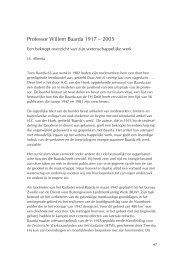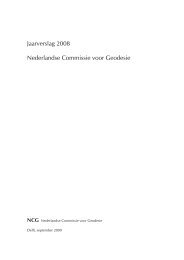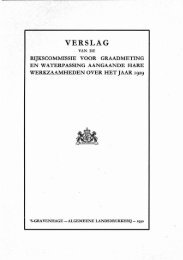SDI Convergence - Nederlandse Commissie voor Geodesie - KNAW
SDI Convergence - Nederlandse Commissie voor Geodesie - KNAW
SDI Convergence - Nederlandse Commissie voor Geodesie - KNAW
Create successful ePaper yourself
Turn your PDF publications into a flip-book with our unique Google optimized e-Paper software.
Studies of cooperation as a subject in itself, however, lead directly to Robert Axelrod.<br />
He is known for his groundbreaking work in game theory and complexity theory and<br />
has also written books that broaden the understanding of cooperation for both scientists<br />
and others (see Axelrod, 1984). Cooperation is an interdisciplinary subject and<br />
greater understanding of this field goes back to basic works y Axelrod and approaches<br />
to game theory by him and others.<br />
Another well known name is Elinor Ostrom. She has made major contributions to the<br />
analytical literature on institutions and to the understanding of human cooperation. She<br />
has shown that neither the state or the market has been successful in solving common-pool<br />
resource problems. She also shows that common-pool problems are sometimes<br />
solved by voluntary organisations rather than by a coercive state. In her opinion<br />
the evolution of institutions for collective action is a worldwide working model with deep<br />
historical roots which combine long-term economic profits with ecological sustainability<br />
and social justice (see Ostrom, 1990).<br />
In this article, the concept of cooperation is addressed through Axelrod’s approach.<br />
Then, this approach is applied to <strong>SDI</strong>. Finally, three steps of <strong>SDI</strong> development with<br />
respect to coordination are identified and directions for further research are provided.<br />
2. COOPERATION<br />
There is no accepted general definition of the term cooperation but in dictionaries it is<br />
explained as “joint operation or action”. Different subject fields have their own definitions.<br />
For instance in sociology, cooperation can be defined as ‘activity shared for mutual<br />
benefit’. In people’s minds cooperation often means ‘working together for a common<br />
goal’. Within the field of spatial data we take that explanation as a starting point.<br />
Cooperation is often associated with positive feelings and values. It would, however,<br />
be better if it was regarded as a ‘tool’ that can be used for both positive and negative<br />
issues. It is perhaps not clear for everyone that cooperation also can be associated<br />
with illegal activities - cartel formation for example.<br />
Even at a very basic level it appears that cooperation is quite complex. Several conditions<br />
have to be fulfilled for cooperation to be a realistic alternative to not cooperating<br />
(Axelrod, 1984):<br />
– The benefit gained by cooperation must be considerably greater than the alternative<br />
benefit gained by attacking/competing;<br />
– The other party must be assumed to have a positive attitude towards cooperation;<br />
– Each of the cooperating parties can only have a share of the total benefit. This share<br />
must be assumed to be big enough to motivate cooperation;<br />
– “Cooperation demands that the future is important” (Axelrod, 1984). It is unlikely that<br />
the benefits of cooperation are gained immediately. A time lapse must be accepted<br />
by all parties and it has been shown that giving up quick rewards in favour of future<br />
benefits is something typically human.<br />
It is clear that the study of cooperation is a truly interdisciplinary one. Knowledge and<br />
experience stem from a variety of subjects for instance biology, psychology, political<br />
science, economy and studies about conflicts and peace. One field, game theory,<br />
stands out and during recent years has contributed considerably to understanding the<br />
mechanisms of cooperation. Game theory is regarded as a part of the science of economics,<br />
often with mathematical theories in focus. The study of certain games in particular<br />
like the prisoners dilemma has contributed to new insights about cooperation.<br />
General knowledge about cooperation is gained from studies using game theory (see<br />
Axelrod 1984), which show that cooperation within organisations often spontaneously<br />
230

















